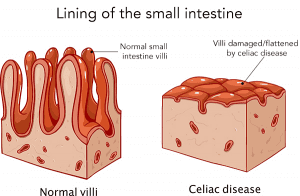Additional in vivo studies are needed to unravel the puzzle of gluten effects in humans and to explore the potential beneficial effects of gluten-free diets in autoimmune diseases. Coeliac disease does cause a gluten intolerance but its not the only cause and autoimmune diseases can easily be triggered by the ongoing symptoms experienced by someone who is gluten intolerant.
If you have an autoimmune condition you want to feel better and reverse the progression of your disease.

Gluten sensitivity cause autoimmune disease. About 25 million Americans are undiagnosed and are. This is because a component of gluten found in grains known as gliadin has been shown to cause leaky gut and inflammation for those with gut issues or autoimmune disease 2. Below are direct quotes from studies.
Gluten sensitivity can cause tissue autoimmunity in the brain thyroid pancreas cardiac joints liver skin adrenals and stomach. It is estimated to affect 1 in 100 people worldwide. The tendency to develop autoimmune diseases is believed to be genetically influenced.
The autoimmune conditions most associated with celiac disease are type 1 diabetes and autoimmune thyroid disease. Researchers took duodenal biopsies from four populations. Celiac Disease is an autoimmune condition whereas Non-Celiac Gluten Sensitivity is a chronic functional digestive disorder triggered by eating gluten-containing foods.
Gliadin is a component of gluten that triggers immune responses in some patients. People with celiac disease are genetically predisposed to launch a self-destructive immune response when a. This is a controversial question but a.
Has found that the incidence of autoimmune thyroid disease was increased equally in those with celiac and in those with non-celiac gluten sensitivity. For reasons that are not completely understood approximately 75 of individuals with autoimmune diseases are women. Patients with active celiac disease patients with celiac in remission patients with gluten sensitivity and patients with no known gluten reactions.
Gluten a gut-derived antigen is the driver of the autoimmunity seen in coeliac disease. If you have an autoimmune condition try eliminating gluten for 30 days and see if you feel better. This condition called non-coeliac gluten sensitivity.
The altered intestinal permeability found in coeliac patients coupled with a genetic predisposition and altered immunological response may result in a systemic immune response that. Its now also recognised that some people are particularly sensitive to gluten. Celiac disease is the most severe form of gluten intolerance.
Results of our studies revealed in the group of 110 patients with diagnosed gluten enteropathy coexistence of autoimmune disease such as diabetes mellitus type 1 in 7. Do those with non-celiac gluten sensitivity have an increased risk of autoimmune diseases like thyroid autoimmunity. It happens over years.
Gluten Causes Inflammation If you have an autoimmune disease then that means that somewhere along the way your immune system went rogue and began attacking your bodys own tissues. One of these diseases is coeliac disease or gluten-sensitivity enteropathy an autoimmune disorder in which the immune system overreacts by producing antibodies when you eat gluten. The purpose of this study was to investigate whether a gluten-free diet affects thyroid autoimmunity hypothalamic-pituitary-thyroid axis activity and thyroid function tests in women with Hashimotos thyroiditis and incidentally found positive anti-tissue transglutaminase antibodies.
In certain nonceliac autoimmune diseases gluten-free diets may help curtail the adverse effects of gluten. In the research studies referenced below gluten intolerance was found to be present in patients with multiple types of autoimmune conditions. Autoimmune thyroid disease is often accompanied by celiac disease.
Healthy control and those with IBS did not have an increased incidence of autoimmunity. Gluten not only causes inflammation an altered microbiome and a leaky gut but it also may be directly triggering autoimmunity in your body through molecular mimicry. We know that 70 of our immune system lies around the gut so whenever there are immune issues you want to look to the gut first and foremost.
Christofides NCGS explains how these foods can trigger gut dysbiosis and neuroinflammation in a predisposed population such as people with hereditary markers for autoimmunity. Celiac disease is an autoimmune disorder that can occur in genetically predisposed people where the ingestion of gluten leads to damage in the small intestine. This change from healthy to autoimmune is not instantaneous.
Known wheat-related illnesses have clear mechanisms and markers. It is an autoimmune disease that affects about 1 of the population and may lead to damage in the digestive system 2.
